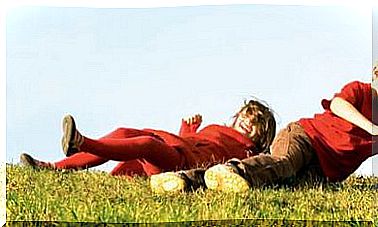Adolescents Affected By The Pandemic: How To Help Them?
The pandemic is psychologically affecting adults but also children and, especially, adolescents. They are suffering from a high degree of emotional distress. How can we help you?

The Covid-19 pandemic, which has skewed so many lives, has now been with us for almost a year. The emotional and psychological consequences of the pandemic, of so many months of tension and restrictions, are being felt in people of all ages: adults, children and, especially, adolescents.
For mothers and fathers, one of the hardest effects that the pandemic is having is to perceive, day by day, how it has worsened the quality of life of their children. The psychological problems (stress, anxiety, fear or depression) arising from the COVID crisis are being perceived especially among adolescents. How to help adolescents affected psychologically by the pandemic during this period?
COVID-19: the first great life crisis of adolescents
It is complicated and difficult not being able to live the life of before, not being able to meet freely with friends, not being able to remove the mask for hours, being away from your loved ones for months, taking a thousand precautions when walking down the street, when shopping .
We all feel tense and psychologically drained.
We have already been involved in this atmosphere of alarm for many months and there is still a long way to go to recover health security.
All these limitations that overwhelm us children and adults, for adolescents are even more suffocating. At a time in life, such as adolescence, characterized by the need to explore new interests, have more freedom and spend a lot of time with his friends, his movements have been greatly restricted.
On the other hand, our adolescents, just at the moment when they are building their identity as adults, are having to face their first great life crisis.
Helping Teens Affected by the Pandemic
As parents or educators, the best way to help them in this maturation process is to offer them a good coping model. A positive model of flexibility and resilience that helps them to cope, from the emotional balance, the difficulties of life.
Over the past few months, many teenagers have asked me for psychological help to try to alleviate the problems caused by this pandemic. One of these young people is Antonio, a 17-year-old boy, who is in his second year of high school and came to see me because, just in such an important year for him, he had totally lost interest in studying.
In our first sessions, Antonio told me that he felt overwhelmed, worried and, above all, emotionally drained. It seemed to him that these months of pandemic and restrictions were being very long and he felt that he was missing a lot of things that he could be doing as a 17-year-old.
Antonio’s case is representative of many young people who are suffering from this pandemic, coinciding with such a crucial and destabilizing stage as adolescence.
These guidelines can help teens suffering from the psychological effects of the pandemic:
- Dialogue
It is essential to promote, in the family, an environment where they can speak, without making judgments or criticizing all the issues that concern them. Adolescents must be given a healthy environment in which they can feel understood and where parents also freely express how they feel.
- Sincerity
In matters as serious as this, we adults do not have the magic solution: we are also suffering enormously. Sharing our fears, emotions and feelings with our children helps them to mature and generates empathy and understanding for themselves and for us.
- Physical activity
Exercise is necessary for all ages, but it especially helps teenagers. Confinement and other limitations put a lot of physical stress on them. Spending time daily to do some type of exercise can be very beneficial, both physically and mentally.
- Learnings
Taking time to reflect on the learning that this crisis is bringing us can be very beneficial for everyone. We can start from the following questions: “What are we learning from this crisis? What things should we value as important? What conclusions can we draw for our lives?”
- This too shall pass
Watching movies or reading self-improvement story books together helps you look at life in perspective. For example, Jorge Bucay has a story in which a wise man reminds the king that bad (and good) times will pass and that nothing is eternal.
These personal stories help our youth broaden their vision and look to the near future with hope.
This pandemic will have an end, it will not last forever. There will come a time when we can resume our lives and regain our freedom of movement. Everything that our teenagers are not doing now (traveling, partying with friends or even starting a romantic relationship), they will be able to experience in a while, when we overcome this crisis.








